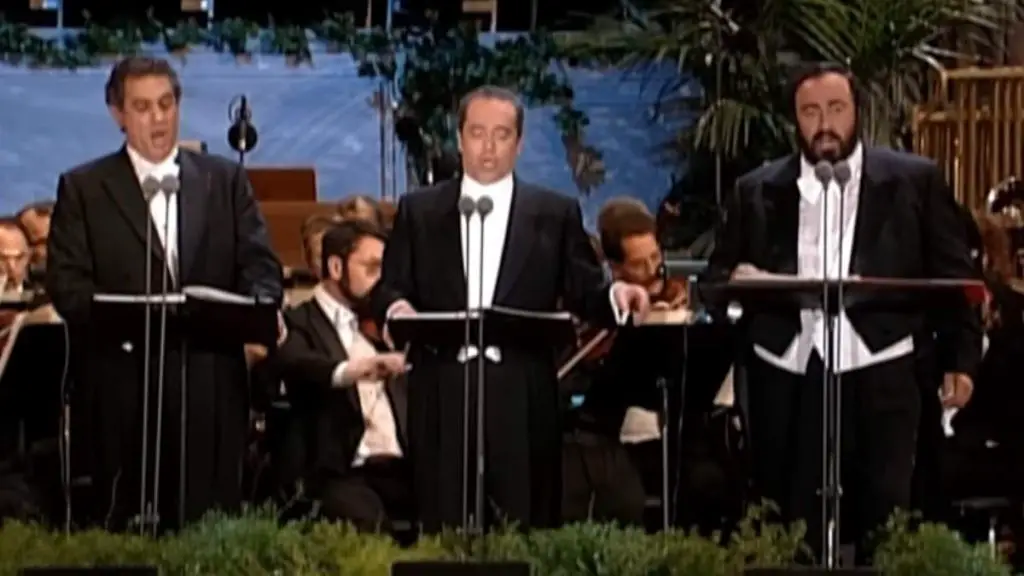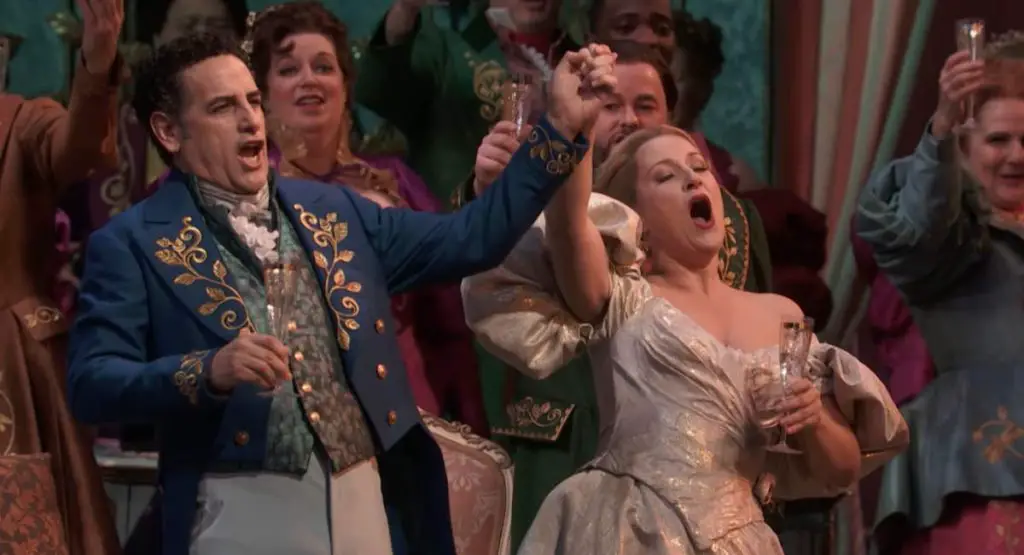Accompanied by the L.A. Philharmonic and the L.A. Music Center Opera Chorus, the most celebrated operatic singing trio of the late 1990s and early 2000s, The Three Tenors (Luciano Pavarotti, José Carreras, and Plácido Domingo) perform “Libiamo ne’ lieti calici” (English: “Let’s drink from the joyful cups”), a famous duet with a chorus from Giuseppe Verdi’s La Traviata, an 1853 opera in three acts. Conductor: Zubin Mehta. This performance was recorded during The Three Tenors’ legendary concert at the Los Angeles Dodger Stadium in July 1994.
Libiamo, ne’ lieti calici
“Libiamo, ne’ lieti calici” (often simply referred to as “Libiamo”) is a famous aria from Giuseppe Verdi’s opera “La traviata,” which premiered in 1853. The opera’s libretto, by Francesco Maria Piave, is based on Alexandre Dumas fils’s play “La Dame aux Camélias” (The Lady of the Camellias).
The aria appears early in the opera, in Act I. Set in a Parisian salon, it is sung as a duet between the protagonists, Alfredo Germont and Violetta Valéry, during a party. Alfredo is persuaded to sing a song for the guests and selects this lively drinking song, “Libiamo,” through which he expresses his love for Violetta. The song’s title can be translated as “Let’s drink from the joyful cups,” and its lyrics celebrate the pleasures of love and life.
“Libiamo, ne’ lieti calici” is one of the most recognized and frequently performed pieces in the opera repertoire. Its melody is infectious, and the duet between the tenor (Alfredo) and soprano (Violetta) captures the essence of young love and revelry. Even those unfamiliar with opera may have encountered it, as it’s often featured in movies, commercials, and other media to signify festivity and elegance.
While “Libiamo” exudes joy and celebration, “La traviata” is a tragic opera, delving into societal pressures, the fleeting nature of happiness, and love’s ultimate sacrifice. This juxtaposition between the early celebratory moments and the later somber events of the opera gives “Libiamo” an added depth within the story’s context.
Libiamo ne’ lieti calici lyrics (libretto)
The text was written by the Italian opera librettist Francesco Maria Piave (18 May 1810 – 5 March 1876).
Italian: Libiamo ne’ lieti calici
Alfredo
Libiamo, libiamo ne’ lieti calici
che la bellezza infiora;
e la fuggevol, fuggevol ora
s’inebrii a voluttà.
Libiam ne’ dolci fremiti
che suscita l’amore,
poiché quell’occhio al core onnipotente va.
Libiamo, amore, amor fra i calici
più caldi baci avrà.
Flora, Gastone, Barone, Dottore, Marchese, coro
Ah, libiam, amor fra’ calici
più caldi baci avrà.
Violetta
Tra voi, tra voi saprò dividere
il tempo mio giocondo;
tutto è follia, follia nel mondo
ciò che non è piacer.
Godiam, fugace e rapido
è il gaudio dell’amore;
è un fior che nasce e muore,
ne più si può goder.
Godiam, c’invita, c’invita un fervido
accento lusinghier.
Flora, Gastone, Barone, Dottore, Marchese, coro
Ah, godiamo, la tazza, la tazza e il cantico,
le notti abbella e il riso;
in questo, in questo paradiso ne scopra il nuovo dì.
Violetta: La vita è nel tripudio.
Alfredo: Quando non s’ami ancora.
Violetta: Nol dite a chi l’ignora.
Alfredo: È il mio destin così.
Tutti
Ah, godiamo, la tazza, la tazza e il cantico,
le notti abbella e il riso;
in questo, in questo paradiso ne scopra il nuovo dì.
Ah, ah, ne scopra il dì. (Ne sco, il no, il novo dì.)
Ah, ah, ne scopra il dì. (Ne sco, il no, il novo dì.)
Ah, sì… (Sì, ne scopra, ne scopra il nuovo dì…)
English: Let’s drink from the joyful cups
Alfredo
Let’s drink, let’s drink from the joyous chalices
that beauty blossoms.
And may the fleeting moment
be elated with voluptuousness.
Let’s drink from the sweet thrills
that love arouses
because that eye aims straight to the almighty heart.
Let’s drink, my love: the love among chalices
will have warmer kisses.
Flora, Gastone, Barone, Dottore, Marchese, Chorus
Ah, let’s drink, my love: the love among chalices
will have warmer kisses.
Violetta
With you, with you, I’ll be able to share
my cheerful times.
Everything is foolish in the world
which is not pleasure.
Let’s enjoy ourselves, for a fleeting and quick
the delight of love is:
it’s a flower that blooms and dies
and can no longer be enjoyed.
Let’s enjoy ourselves, fervent
flattering voice invites us.
Flora, Gastone, Barone, Dottore, Marchese, Chorus
Ah, let’s enjoy the cup, the cup, and the chants,
the embellished nights and the laughter;
let the new day find us in this paradise.
Violetta: Life means celebration.
Alfredo: If one hasn’t known love.
Violetta: Don’t tell someone who doesn’t know.
Alfredo: But this is my fate.
All
Ah, let’s enjoy the cup, the cup, and the chants,
the embellished night and the laughter;
let the new day find us in this paradise.
Ah, ah, let the new day find us. (We shall let the new day find us.)
Ah, ah, let the new day find us. (We shall let the new day find us.)
Ah, yes… (Yes, we shall let, we shall let the new day find us…)

Sources
- Libiamo ne’ lieti calici on Wikipedia

![Kurzak, Popov: "Libiamo ne' lieti calici [Verdi]](https://cdn-0.andantemoderato.com/wp-content/uploads/2024/01/Aleksandra-Kurzak-Dmytro-Popov-Libiamo-ne-lieti-calici-1024x576.jpg)
![The Three Tenors: Around the World [Medley]](https://cdn-0.andantemoderato.com/wp-content/uploads/2023/05/Three-tenors-medley-1024x576.jpg)